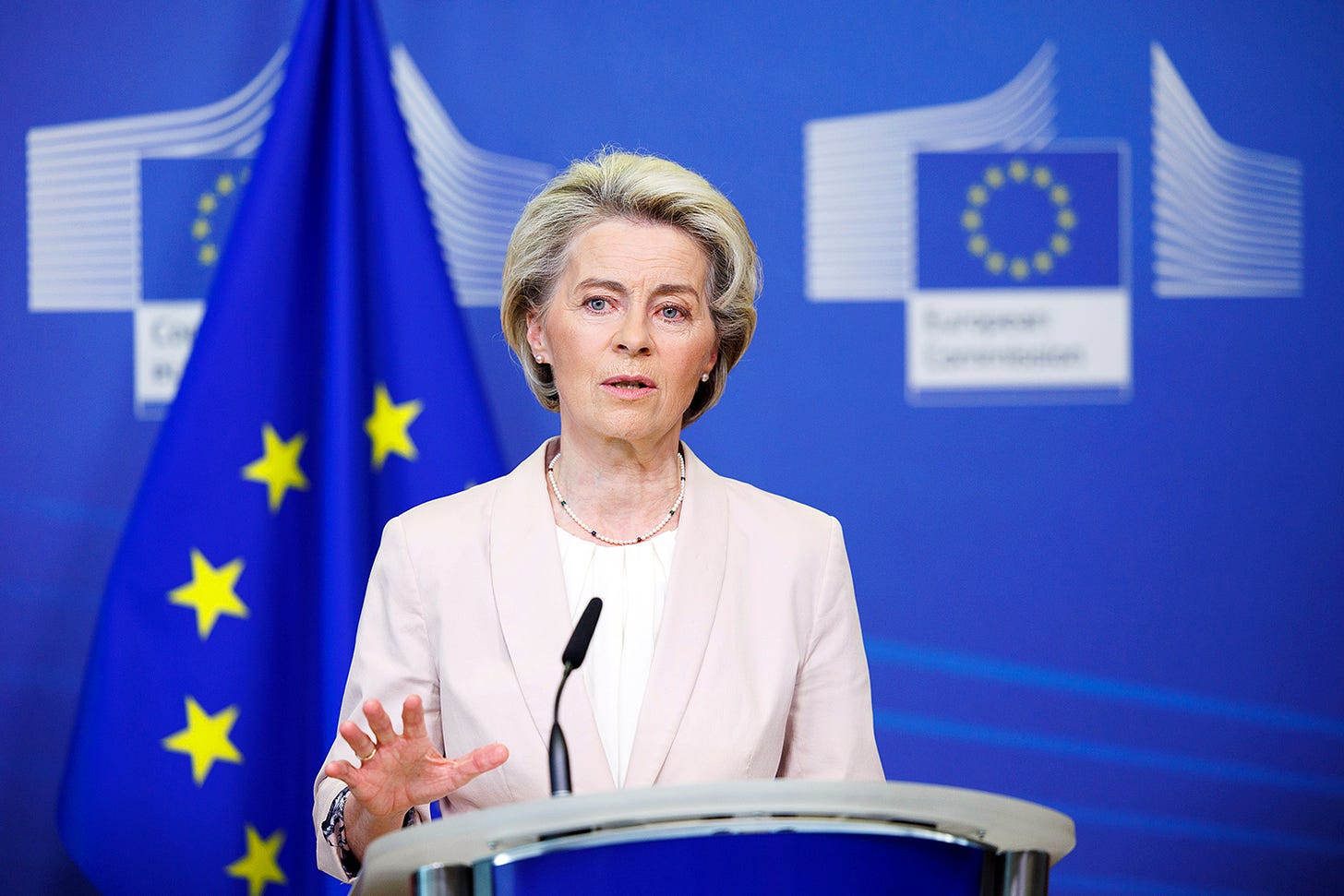EU Proposes to Cap Electricity, Russian Gas Prices
The plan may go too far for some member states.

European Commission president Ursula von der Leyen has proposed an unprecedented intervention in European energy markets to bring down electricity and gas prices:
Cap the price Europe pays for Russian gas.
Cap prices of electricity generated in non-gas plants.
Mandate energy conservation during peak hours.
Tax windfall profits made by energy companies to finance relief for small businesses and households.
Russia immediately threatened to cut off all energy supplies if member states agreed to the plan.
The Netherlands, which led the opposition to a blanket cap on gas prices, could support one for Russian gas.
The Czech Republic, which holds the rotating presidency of the EU, remains skeptical. Industry minister Jozef Síkela told reporters a council of European energy ministers on Friday would consider only two proposals: delinking electricity and gas prices, and capping electricity generated in non-gas plants. (The second requires the first.)
What to cap
Europe imported 40 percent of its gas from Russia before the war in Ukraine escalated. That share fell to 20 percent this year, and 9 percent this summer, according to Von der Leyen. A ban on Russian oil is scheduled go to into effect in February.
Countries in Central Europe which depend on Russian gas pipeline flows through Ukraine have argued for a cap on the price of all imported natural gas. A cap not specific to Russia might just persuade Vladimir Putin to keep the gas flowing, but it could also convince exporters of liquified natural gas, like America and Qatar, to sell to Asia. Italy would cap prices of piped gas.
Politico Europe reports that Spain’s solution to subsidize gas consumed by power plants lost appeal in Brussels after it turned out Spanish gas use went up during the summer. That would seem to confirm Dutch fears that price caps disincentivize energy conservation. Although in the case of Spain, lack of hydroelectricity and increased use of airconditioning due to exceptionally hot weather played a role.
Prices pushed up
The shortage of gas has been aggravated by governments buying gas on the wholesale market to fill storage sites for the winter.
Gas was traded for nearly €350 per megawatt-hour on the benchmark Dutch market in August. Prices have stabilized at €240 to €250, but that is still an eightfold increase from a year ago.
Electricity prices are up too. The Netherlands gets 46 percent of its power from burning gas, Italy 51 percent. Even in countries that rely on coal, nuclear and renewables, the high price of gas makes electricity more expensive. That is because the wholesale price of electricity is determined by the more expensive source needed to meet demand, and that’s gas, since gas plants are easier to switch on and off than others.
Broken market
Hence the Commission’s proposal to cap non-gas power prices and tax windfall profits. Coal, nuclear and renewables have become extremely profitable while firms and households have never paid higher energy bills.
But capping some prices, taxing profits and using the proceeds to subsidize consumers is a roundabout way of fixing a broken market.
The core problem is that we have something approaching a single markt for energy consumption and distribution in Europe, with integrated grids and retailers that operate in multiple countries, while production and generation remain under national control. And member states have followed contradictory strategies.
Different views on nuclear and gas
When Germany decided to simultaneously phase out coal and nuclear, it doubled down on natural gas and exported the damage. Drilling for natural gas caused earthquakes in the Netherlands and methane pollution in Russia.
Germany agreed to build the Nord Stream pipelines in the Baltic Sea to become independent of gas transit nations in Eastern Europe. Now that Russia has stopped pumping gas through Nord Stream, Germany finds itself at the mercy of its eastern neighbors, who still get gas from Russia, and international energy markets.
Unlike the Netherlands and Spain, Germany did not build terminals to import LNG. It has scrambled to rent five mobile platforms. It has asked the Dutch for more gas, but they are in no mood to risk more earthquakes, especially when — even now — Germany won’t commit to keep two of its remaining three nuclear reactors online beyond the spring.
Germany is not the only country where domestic politics prevail. Despite pleas from Berlin and Madrid, France refuses to connect a natural gas pipeline that terminates in the Pyrenees of Catalonia and which could bring more gas from North Africa. The French argue the billions of euros needed to connect this Midcat pipeline to the European network aren’t worth it, and anyway Europe should become less dependent on fossil fuels. France gets 70 percent of its electricity from nuclear plants.
Correction: An earlier version of this story claimed Italy had proposed to cap all natural gas prices in the EU. It has proposed to cap the price of piped gas.



